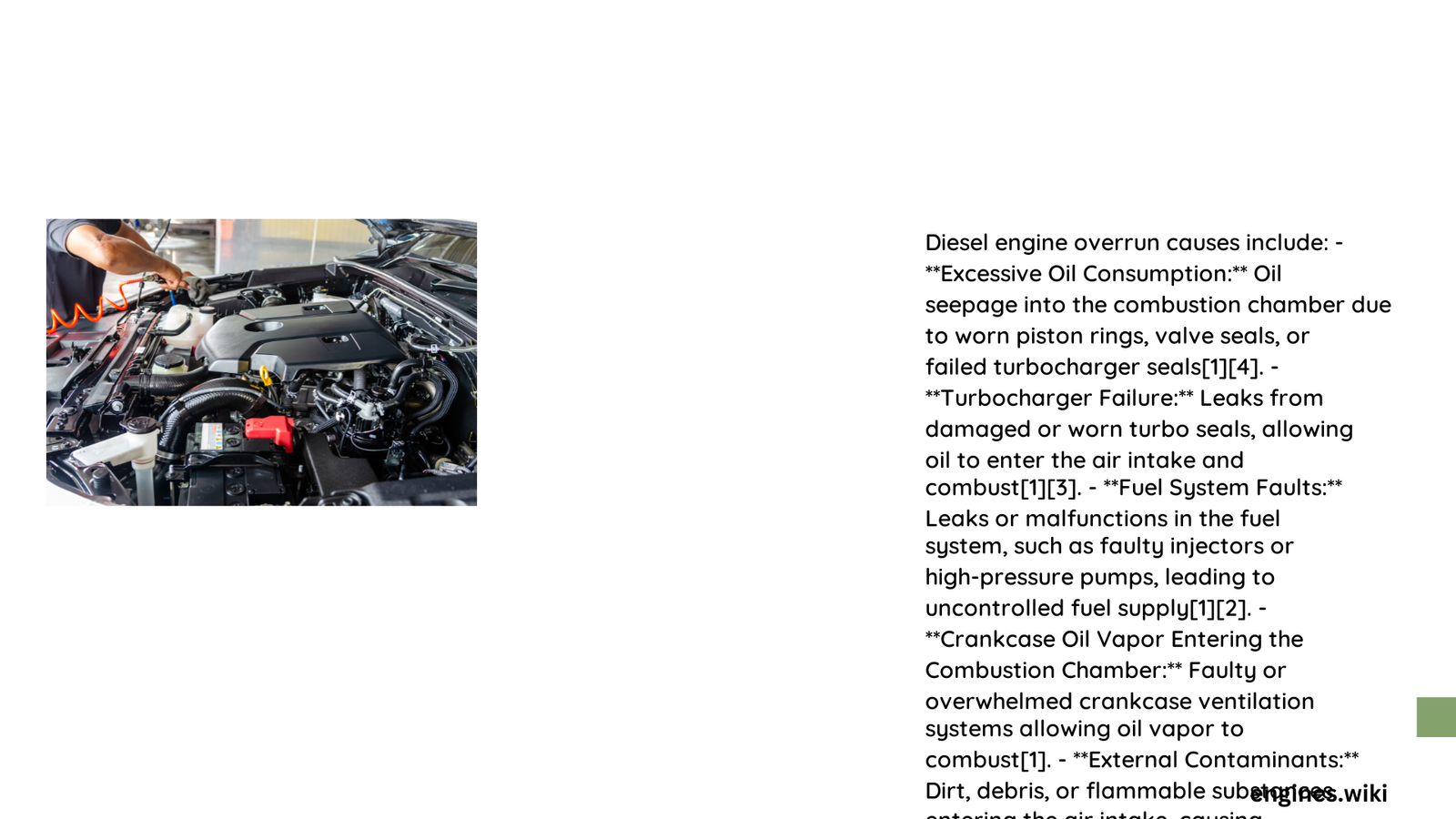Diesel engine overrun represents a critical mechanical failure where an engine accelerates uncontrollably beyond its designed operational parameters, potentially causing catastrophic damage. This phenomenon emerges from complex interactions between mechanical components, involving oil seepage, fuel system malfunctions, and compromised engine seals that enable unregulated combustion processes, transforming a controlled power generation system into an unpredictable and potentially destructive mechanical event.
What Triggers Diesel Engine Overrun?
Mechanical Failure Mechanisms
Diesel engine overrun causes stem from intricate mechanical vulnerabilities that disrupt normal combustion cycles. The primary mechanisms include:
Oil and Hydrocarbon Infiltration Pathways
- Turbocharger Seal Degradation
- Allows oil leakage into intake system
- Increases risk of uncontrolled combustion
- Typical failure points include:
- Worn turbo shaft seals
- Compromised bearing surfaces
- Excessive crankcase pressure
Fuel System Vulnerability Points
| Component | Failure Potential | Overrun Risk |
|---|---|---|
| Fuel Injectors | High | Moderate to Critical |
| High-Pressure Pump | Moderate | Low to Moderate |
| Fuel Pressure Regulator | Low | Low |
How Do Electronic Control Systems Contribute?
Electronic Control Unit (ECU) failures rarely directly cause overrun, but can create conditions conducive to mechanical failures:
- Incorrect fuel metering signals
- Compromised sensor feedback loops
- Intermittent electrical system disruptions
What Are the Diagnostic Strategies?
Comprehensive Inspection Protocol
- Visual System Assessment
- Check for visible oil/fuel leaks
- Inspect turbocharger mounting
-
Examine crankcase ventilation system
-
Instrumentation Diagnostics
- Utilize OBD-II scanner
- Perform pressure tests
- Conduct leak-down evaluations
Prevention and Mitigation Strategies
Maintenance Best Practices
- Regular oil analysis
- Timely filter replacements
- Periodic turbocharger inspection
- Consistent fuel system maintenance
Technical Intervention Techniques
When overrun is detected, immediate actions include:
- Emergency Shutdown Methods
- Disconnect air intake
- Cut fuel supply
- Activate emergency kill switch
Cost Implications of Diesel Engine Overrun
Potential Repair Expenses:
– Turbocharger replacement: $1,000 – $3,000
– Fuel injector replacement: $500 – $2,000
– High-pressure pump repair: $1,500 – $4,000
Technical Complexity Factors
Diesel engine overrun causes are rarely singular, often representing complex interactions between:
– Mechanical wear
– Lubrication system failures
– Combustion chamber dynamics
– Fuel delivery mechanisms
Expert Recommendations
- Conduct quarterly comprehensive engine diagnostics
- Monitor oil consumption patterns
- Replace wear-prone components proactively
- Train maintenance personnel in early detection techniques
Technological Advancements
Modern diesel engines incorporate advanced monitoring systems that can:
– Detect abnormal combustion characteristics
– Implement automatic protective shutdown
– Log diagnostic information for detailed analysis
Conclusion

Understanding diesel engine overrun causes requires a multifaceted approach combining mechanical knowledge, diagnostic expertise, and proactive maintenance strategies.
